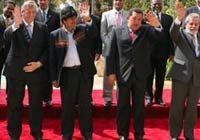No advances in a South American Energy Summit sponsored by Chavez
Bilateral controversies dominated the two-day leaders’ meeting in a Venezuelan resort.

The two-day South American summit to discuss energy issues sponsored and hosted by Venezuelan president Hugo Chavez, left more controversies than tangible conclusions as leaders from the 12 countries could not put aside differences and postponed agreements to future meetings.
The main controversy came as Brazil’s President Luiz Inacio Lula Da Silva defended the ethanol agreement signed with the United States, despite Chavez’s efforts to undermine the deal in favor of using his country’s vast reserves of oil and gas as the key source of the proposed regional energetic integration. Lula believes, as US President George Bush publicly remarked, that it is necessary to reduce world’s dependence on fossil-based fuels and increase the use of biofuels.
The U.S. and Brazil are the world's two biggest producers of ethanol, the alcohol-based fuel made from crops such as sugarcane or corn. They signed an "alliance" last month to promote its production in the region and create international quality standards to allow it to be traded as a commodity like oil.
Chavez did not publicly discuss his dispute, but the Venezuelan leader has pledged to explain his objections to last month's U.S.-Brazil ethanol agreement. Chavez, a staunch critic of U.S. President George W. Bush, has warned that Brazil's deal with Washington would monopolize arable lands and starve the poor _ concerns shared by his Cuban ally Fidel Castro.
But Marco Aurelio Garcia, an adviser to Silva, denied that Brazil's plan would cause food prices to skyrocket and defended it as a way of creating jobs. "Nobody stops eating due to shortage of food. People stop eating due to lack of income. That's the fundamental issue," Garcia said.
In an attempt to counterattack Brazil’s proposal, Venezuela, sided by Argentina and Bolivia proposed to create “a South American gas OPEC”, which could eventually set prices and quotas across the region. The remaining nations were caught by surprise by the proposal and coldly promised to study it.
The summit was not a success as Chavez expected. Presidents of Uruguay, Tabare Vazquez and of Peru, Alan Garcia –both lead center-left coalitions- failed to attend. The Chilean leader Michelle Bachelet –also backed by moderate leftists- arrived late and poorly participated in the discussions. The Argentine President, Nestor Kirchner –counted as an ally of Chavez- got bored and departed earlier in the middle of a leaders’ meeting.
Brazil also frustrated advances on the creation of a regional “Bank of the South” proposed by Caracas and Buenos Aires. The financial institution was aimed at funding projects to develop infrastructure across the region.
“Just a joke”
On Wednesday night, Chavez dismissed a joke he’d made earlier during the day. At that time, the charismatic leader suggested that Venezuela was trying to buy a nuclear power plant from Argentina to put on its border with Colombia.
“Argentina also has nuclear energy, right? I think they're even exporting to some countries. I hope they export a small plant to us and we can put it -- Alvaro -- there on the border,'' Chavez said, addressing his Colombian counterpart and closest US ally in South America, Alvaro Uribe.
Uribe did not hide his consternation and when asked about the comment at a press conference following the summit last night, Chavez dismissed it as a joke designed to “make headlines,'' and said that Venezuela has no short-term plans to buy a nuclear facility from Argentina. “It's not a priority for us at this moment,'' Chavez said.
Hernan Etchaleco
Subscribe to Pravda.Ru Telegram channel, Facebook, RSS!





